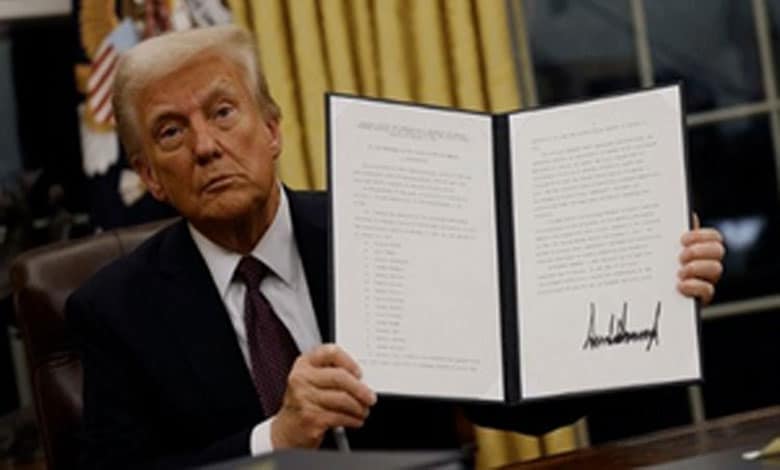Trump’s Executive Order on Birthright Citizenship Sparks Immediate Legal Battle
Hours after President Donald Trump signed an executive order aimed at ending birthright citizenship, a coalition of civil rights and immigration groups filed a lawsuit challenging the move. The lawsuit, filed in federal court in New Hampshire, sets the stage for a major legal battle over the controversial order.

Washington: Hours after President Donald Trump signed an executive order aimed at ending birthright citizenship, a coalition of civil rights and immigration groups filed a lawsuit challenging the move. The lawsuit, filed in federal court in New Hampshire, sets the stage for a major legal battle over the controversial order.
Table of Contents
Trump’s Executive Order on Birthright Citizenship
The executive order, signed by President Trump on Monday night, directs federal agencies to deny U.S. citizenship to children born on American soil to parents who are in the country illegally or on temporary visas, unless one parent is a U.S. citizen or lawful permanent resident. Under the order, children born in such circumstances would not be eligible for U.S. citizenship or passports, with the new policy set to take effect 30 days from the signing date.
This executive order challenges a long-standing legal consensus that birthright citizenship is guaranteed by the 14th Amendment of the U.S. Constitution, which states, “All persons born or naturalized in the United States, and subject to the jurisdiction thereof, are citizens of the United States.”
Legal Challenges and Lawsuit
The American Civil Liberties Union (ACLU), along with several state chapters and other organizations, filed a 17-page lawsuit arguing that the executive order is unconstitutional and illegal. The lawsuit, which represents immigration rights groups and affected families, claims that the order seeks to strip children of their birthright citizenship, leaving them vulnerable to exclusion and deportation from the only country they have ever known.
“For plaintiffs — organizations with members impacted by the order — and for families across the country, this order seeks to strip from their children the ‘priceless treasure’ of citizenship, threatening them with a lifetime of exclusion and fear of deportation,” the lawsuit states.
Implications of Trump’s Order
The lawsuit calls for the federal court to declare the executive order unlawful and to issue both temporary and permanent injunctions to block its enforcement. Trump’s order specifically states that the federal government should not issue documents recognizing U.S. citizenship for children born to parents who are unlawfully or temporarily in the country.
Also Read: Trump’s Bold Claim: “I Can End the Ukraine War in a Day” – But Will Putin Agree?
The ACLU warns that the order could render affected children stateless, creating widespread fear and uncertainty among immigrant communities. Some of the immigration groups involved in the lawsuit have members who are expecting children who could be impacted by the order.
Legal Battle and Potential Supreme Court Review
The legal battle surrounding Trump’s executive order is expected to escalate, with the case likely to reach higher courts, including the U.S. Supreme Court. The order aligns with Trump’s broader immigration agenda but faces significant legal hurdles, as the 14th Amendment provides clear protections for birthright citizenship.
As this lawsuit unfolds, it will have major implications for U.S. immigration policy and the interpretation of the 14th Amendment.
Stay updated on the latest developments in the legal fight over President Trump’s birthright citizenship executive order.
